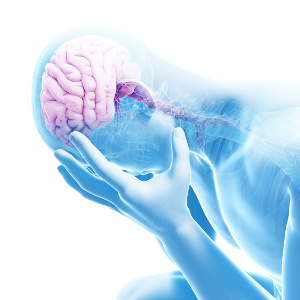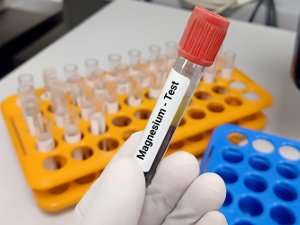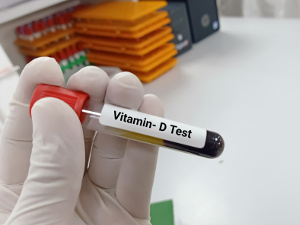Breast cancer: More selenium in the blood improves survival
 Breast cancer is the leading cancer form among women. Even though treatments have gotten a lot better the disease still has a high death toll. A Swedish-German study shows that having low levels of selenium in the blood worsens the prognosis, whereas having a higher selenium content in the blood can increase the odds of surviving breast cancer. Unfortunately, selenium deficiency is rather common in Europe. According to the scientists behind the new study, measurements of selenium status can be used to optimize blood levels of the nutrient, thereby improving treatment correspondingly.
Breast cancer is the leading cancer form among women. Even though treatments have gotten a lot better the disease still has a high death toll. A Swedish-German study shows that having low levels of selenium in the blood worsens the prognosis, whereas having a higher selenium content in the blood can increase the odds of surviving breast cancer. Unfortunately, selenium deficiency is rather common in Europe. According to the scientists behind the new study, measurements of selenium status can be used to optimize blood levels of the nutrient, thereby improving treatment correspondingly.
Read more about breast cancer: Higher blood levels of selenium increase your survival
- Created on .








 The summer sun is our primary source of vitamin D, and previous population studies have suggested that vitamin D may help prevent breast cancer from developing. Danish scientists have looked closer at this relation and found that women from 50 years of age and older who spend a lot of time outdoors – especially between 10 am and 3 pm – have a lower risk of breast cancer. This is important knowledge because it takes years for breast cancer to develop. Vitamin D appears to have a number of different anti-cancer mechanisms, which is why it is vital for us humans to get plenty of the nutrient throughout life.
The summer sun is our primary source of vitamin D, and previous population studies have suggested that vitamin D may help prevent breast cancer from developing. Danish scientists have looked closer at this relation and found that women from 50 years of age and older who spend a lot of time outdoors – especially between 10 am and 3 pm – have a lower risk of breast cancer. This is important knowledge because it takes years for breast cancer to develop. Vitamin D appears to have a number of different anti-cancer mechanisms, which is why it is vital for us humans to get plenty of the nutrient throughout life. Lack of iron is the most widespread nutrient deficiency in the world and the most common cause of anemia. Iron deficiency causes fatigue, dizziness, paleness, impaired immunity, hair loss, and a host of other symptoms. It can cause stunted growth and learning difficulty in children. Some of the things that can cause iron deficiency are heavy menstrual bleeding, pregnancy, vegetarian/vegan diets, lack of vitamin C, antacids, inflammatory bowel diseases, and celiac disease. Excess iron, on the other hand, can also spell trouble by generating harmful free radicals that attack our cells. So, it is important not to get too little or too much iron – but just the right amount. In the following, you can read more about iron and its importance for our health.
Lack of iron is the most widespread nutrient deficiency in the world and the most common cause of anemia. Iron deficiency causes fatigue, dizziness, paleness, impaired immunity, hair loss, and a host of other symptoms. It can cause stunted growth and learning difficulty in children. Some of the things that can cause iron deficiency are heavy menstrual bleeding, pregnancy, vegetarian/vegan diets, lack of vitamin C, antacids, inflammatory bowel diseases, and celiac disease. Excess iron, on the other hand, can also spell trouble by generating harmful free radicals that attack our cells. So, it is important not to get too little or too much iron – but just the right amount. In the following, you can read more about iron and its importance for our health. There is a link between depression, dementia and Alzheimer’s disease. Also, it appears that chronic stress contributes to oxidative stress and brain cell damage. In a review article that is published in the science journal Antioxidants, researchers look closer at how oxidative stress affects the brain. They also study how antioxidants can be included in the prevention and treatment of Alzheimer’s disease, and why the most promising results are seen with selenium, Q10, melatonin, vitamin E, turmeric, and polyphenols. With regard to depression, selenium, zinc, vitamin E, turmeric, and saffron have demonstrated the greatest potential.
There is a link between depression, dementia and Alzheimer’s disease. Also, it appears that chronic stress contributes to oxidative stress and brain cell damage. In a review article that is published in the science journal Antioxidants, researchers look closer at how oxidative stress affects the brain. They also study how antioxidants can be included in the prevention and treatment of Alzheimer’s disease, and why the most promising results are seen with selenium, Q10, melatonin, vitamin E, turmeric, and polyphenols. With regard to depression, selenium, zinc, vitamin E, turmeric, and saffron have demonstrated the greatest potential. Chronic heart failure is a clinical syndrome that involves, among other things, reduced heart pumping function. The condition is often life-threatening. A new study that is published in Journal of the American Heart Association looks closer at how supplementation with magnesium can help the heart muscle contract with greater force and perhaps be a useful adjuvant in the treatment of heart failure. The study supports another study that is published in Diabetes Care. In this study, it is demonstrated that lack of magnesium is linked to heart failure, atrial fibrillation, and other complications from type 2 diabetes.
Chronic heart failure is a clinical syndrome that involves, among other things, reduced heart pumping function. The condition is often life-threatening. A new study that is published in Journal of the American Heart Association looks closer at how supplementation with magnesium can help the heart muscle contract with greater force and perhaps be a useful adjuvant in the treatment of heart failure. The study supports another study that is published in Diabetes Care. In this study, it is demonstrated that lack of magnesium is linked to heart failure, atrial fibrillation, and other complications from type 2 diabetes. Q10 is a unique compound with a key role in cellular energy turnover. It also serves as a powerful antioxidant. The body is able to synthesize most of the Q10 that it needs but as we grow older, our endogenous synthesis decreases, making us vulnerable in different ways. Cholesterol-lowering medicine and certain types of disease are also associated with lower levels of Q10 in the body. In a new review article, a group of scientists have scrutinized hundreds of Q10 studies that have been published in the years 2010-2020. They are able to conclude that Q10 is of particular importance to the heart, circulatory system, fertility, muscles, eyes and vision, and the ageing process. Things like migraines, chronic fatigue syndrome, and neurodegenerative diseases such as Parkinson’s and Alzheimer’s disease are also addressed. The body has difficulty with absorbing Q10 from food and supplements so it is recommendable to always choose a pharmaceutical-grade Q10 preparation with documented bioavailability.
Q10 is a unique compound with a key role in cellular energy turnover. It also serves as a powerful antioxidant. The body is able to synthesize most of the Q10 that it needs but as we grow older, our endogenous synthesis decreases, making us vulnerable in different ways. Cholesterol-lowering medicine and certain types of disease are also associated with lower levels of Q10 in the body. In a new review article, a group of scientists have scrutinized hundreds of Q10 studies that have been published in the years 2010-2020. They are able to conclude that Q10 is of particular importance to the heart, circulatory system, fertility, muscles, eyes and vision, and the ageing process. Things like migraines, chronic fatigue syndrome, and neurodegenerative diseases such as Parkinson’s and Alzheimer’s disease are also addressed. The body has difficulty with absorbing Q10 from food and supplements so it is recommendable to always choose a pharmaceutical-grade Q10 preparation with documented bioavailability. Cancer patients often have overwhelming pain that turns up as their disease progresses. The whole purpose with palliative care is to relieve the pain, and opioids such as morphine are often used for this purpose. However, according to a Swedish study published in the science journal Cancer, more and more terminal cancer patients who are given high-dosed supplements of vitamin D have less need for pain treatment and generally feel less tired. Vitamin D deficiencies are common among cancer patients and may contribute to a shorter life expectancy.
Cancer patients often have overwhelming pain that turns up as their disease progresses. The whole purpose with palliative care is to relieve the pain, and opioids such as morphine are often used for this purpose. However, according to a Swedish study published in the science journal Cancer, more and more terminal cancer patients who are given high-dosed supplements of vitamin D have less need for pain treatment and generally feel less tired. Vitamin D deficiencies are common among cancer patients and may contribute to a shorter life expectancy. Preeclampsia is a precursor of eclampsia, a condition characterized by spasms and seizures that can be life-threatening for the expecting mother and her unborn child. According to a new review article that is published in the science journal Cureus, injections of magnesium sulfate have been tested as part of the treatment for severe preeclampsia and related spasms. This therapy form has also been introduced in Denmark. It is important during pregnancy to get enough magnesium to prevent eclampsia.
Preeclampsia is a precursor of eclampsia, a condition characterized by spasms and seizures that can be life-threatening for the expecting mother and her unborn child. According to a new review article that is published in the science journal Cureus, injections of magnesium sulfate have been tested as part of the treatment for severe preeclampsia and related spasms. This therapy form has also been introduced in Denmark. It is important during pregnancy to get enough magnesium to prevent eclampsia. Main meals are vital for stabilizing blood sugar levels, which makes it easier to concentrate in school. Fruit and vegetables are good sources of vitamin C, folic acid, magnesium, and many other useful nutrients. According to a new British study, children who eat breakfast and lunch and get more fruit and vegetables have better mental health by a number of different parameters. It is also a fact that many children don’t thrive and that lack of nutrients can trigger or exacerbate the problem. For that reason, the researchers call for a better health policy at home and at school to ensure that children get healthy diets, simply because it optimizes their mental well-being and academic potential.
Main meals are vital for stabilizing blood sugar levels, which makes it easier to concentrate in school. Fruit and vegetables are good sources of vitamin C, folic acid, magnesium, and many other useful nutrients. According to a new British study, children who eat breakfast and lunch and get more fruit and vegetables have better mental health by a number of different parameters. It is also a fact that many children don’t thrive and that lack of nutrients can trigger or exacerbate the problem. For that reason, the researchers call for a better health policy at home and at school to ensure that children get healthy diets, simply because it optimizes their mental well-being and academic potential.